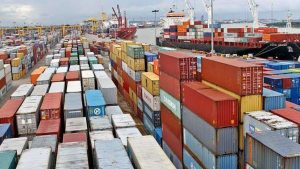
A recent report presented by the Nigerian Ports Consultative Council (NPCC) in Lagos, has revealed that there are empty containers accounted for approximately 80% of outbound traffic from Nigerian ports in 2023.
The report also highlighted a decline in cargo import and export during the same period.
In terms of container traffic, the report indicated that a total of 1,566,162 twenty-foot equivalent units (TEUs) were handled in 2023, reflecting a 6.8% decrease compared to the 1,681,328 TEUs in 2022. Import container traffic represented 55.85% of the total with 874,683 TEUs, while export container traffic accounted for 43.71% with 684,586 TEUs.
The report further revealed a decline of 6.4% in inward cargo throughput (excluding oil), which stood at 70,475,671 metric tonnes in 2023 compared to 75,274,843 metric tonnes in 2022. Inward cargo traffic constituted 65.8% of the total cargo throughput for the year, amounting to 46,378,186 metric tonnes. Outward cargo traffic accounted for the remaining 34.2% with 24,097,485 metric tonnes.
Another notable finding was the decrease in the handling of vehicles, with a total of 132,296 units recorded in 2023, marking a 32% decline from the 194,550 units in 2022. The number of ships berthed at Nigerian ports also decreased by 4.5% from 3,957 in 2022 to 3,778 in 2023. However, the gross tonnage of ships completed increased by 2.1% to 122,873,684 gross tonnes.
The report highlighted that the average turn-around time for vessels improved to four days in 2023, compared to 5.2 days in the previous year. This improvement was attributed to the impact of the Lekki deep seaport, which achieved an average turn-around time of one day. The berth occupancy rate for the year was reported at 32%, a decrease from the 36.6% recorded in 2022.
Various factors were identified as contributing to the decline in cargo import and export, including the global economic lull, the COVID-19 pandemic, anti-trade policies of the Nigerian government, and other operational challenges. The report also expressed concerns about the significant drop in the number of TEUs received by Nigerian seaports, from over 14,000,000 TEUs in 2014 to 1,566,162 TEUs in 2023.
In light of these findings, the report called for deliberate fiscal policies by the federal government to revive Nigeria’s trade industry and alleviate stakeholders’ concerns. It also highlighted the need for redesigning the perimeter limits of Apapa and Tincan Island Ports, addressing operational issues related to railway crossings, improving road infrastructure, and implementing port planning and modernization initiatives.
During the presentation of the report, Captain Iheanacho Ebubeogu, the Chairman of the Port Operations and Logistics Committee of NPCC, emphasized the importance of collaboration between the NPCC and maritime institutions to further develop the port industry. Dr. Bashir Jamoh, the Director General of the Nigerian Maritime Administration and Safety Agency (NIMASA), echoed this sentiment, emphasizing the NPCC’s role as the strongest body of maritime stakeholders in driving the industry forward.

